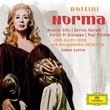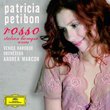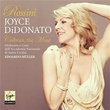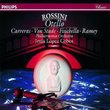| All Artists: Paolo Arrivabeni Gioachino Rossini, Patrizia Ciofi, Simon Edwards Irine Ratiani Title: Rossini - Otello (Malibran Version) / Ratiani · Ciofi · Edwards · Bonfatti · Kang · Paolo Arrivabeni Members Wishing: 0 Total Copies: 0 Label: Dynamic Italy Release Date: 4/24/2001 Album Type: Box set Genre: Classical Style: Opera & Classical Vocal Number of Discs: 3 SwapaCD Credits: 3 UPC: 675754358327 |
Search - Paolo Arrivabeni Gioachino Rossini, Patrizia Ciofi, Simon Edwards Irine Ratiani :: Rossini - Otello (Malibran Version) / Ratiani · Ciofi · Edwards · Bonfatti · Kang · Paolo Arrivabeni
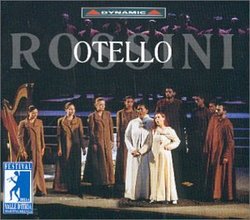 | Paolo Arrivabeni Gioachino Rossini, Patrizia Ciofi, Simon Edwards Irine Ratiani Rossini - Otello (Malibran Version) / Ratiani · Ciofi · Edwards · Bonfatti · Kang · Paolo Arrivabeni Genre: Classical
|
Larger Image |
CD DetailsSimilar CDs |
CD ReviewsRossini otello ( malibran version ) 12/31/2002 (5 out of 5 stars) "Since Verdi's Otello is one of my favorite operas I must admit that I was reticent about listening to Rossini's version of Shakespeare's tragedy. I was quite mistaken. Otello is one of Rossini's finest operas and is as different from Verdi's Otello as Norma is from Aida. This recording by Dynamic does not use the original tenor role that Rossini composed for the character of otello but uses the soprano variation I'm assuming Rossini wrote later for the great prima donnas, Pasta and then for Maria Malibran ( the Maria Callas of the ninetenth century). The only place I had to adust myself with a female voice for Otello was in the confrotation between Otello and Desdemona before he strangles her. It was difficult keeping tract of which character was singing. If I spoke Italian or was seeing this performance I'm sure this would not be a problem, my ears soon adjusted. I have three wonderful things to say about this recording. First the sound quality surpasses that of any live cd I have heard, almost on a studio level. Second the singers are on an equal level-Superb. Third, the more I listen the more I fall in love with the music. Desdemona's willow song is, in my opion, one of the most haughting arias in opera. This does not lessen Verdi's and Boito's great accomplishment. I believe that Rossini's Otello was Italian opera's first tragic ending. Still, much of the public was not ready for a violent ending with no redeeming value. So Rossini also wrote a alternative happy ending for Otello's first performance in Rome. This cd has both endings. The bel canto in this recording is breathtaking, the melodies enchanting, the music of the drama moving. So I learned something, Rossini could compose tragic operas with the best of them. If you love opera, buy this recording. Viva Verdi and Rossini" Very excellent version BDSinC | Calgary, Alberta, Canada | 12/20/2008 (5 out of 5 stars) "I found this recording quite excellent. There has been a complaint about the "wild vibrato" of the singers. I have NEVER heard any of that in this recording. I am not sure the person even knows what they are talking about in relationship to that point. NONE Of the melodies were obscured by any vibrato, overly strong or otherwise, nor was any of the coloratura muddied by it. I really enjoyed following the recording with the score (I have the Tenor Otello version, both a French version and the Italian one, there are differences between the two, and the Malibran score seems a marrying together of the best of the two, but nothing really difficult is cut). I really found it refreshing to hear embellishments occuring where they would have occured, and some actually that were written by Rossini for various singers who sang the role. There is a sort of "disconnect" hearing Otello sung by a woman, but the singing was very excellent. My only question was the quality of the two women, one singing Otello the other singing desdemona. Their voices really were too much alike. Since Desdemona was written for Rossini's wife, and her voice really was dark and seldom went higher than a B flat, it would have been more adviceable to have Otello sung, not by a mezzo (which Desdemona obviously is, even if a lyric one) but by a real contralto (Ewa Podles type, who could have touched the High D in the Trio). The contrast would have been more impressive, as would the lower lying vocal lines for Otello in the duets and ensembles.
There has been a complaint that the coloratura was inaccurate. That I have not found to be the case. It was NOT separated with "H" sounds (like Bartoli, which is very WRONG singing even if acceptable today), but it was clear. And the man who sang Rodrigo (which is a really high tenor role) did a fine job, and sang his role quite accurately. The Iago was also impressive, as was Desdemona's father (even though his role is really small). For those who would compare this to Shakespeare, forget it. Shakespeare was NOT even known in Italy at the time Rossini wrote his opera (or at the time Bellini wrote I Capuletti i e Montecchi). The source stories that Shakespeare would use for his immortal plays were well known throughout most of Europe, and those are the sources the librettist turned to. The score actually indicates that Desdemona is STABBED not strangled. So, the historical humor of having Malibran singing Otello to the very large German soprano as Desdemona is less "silly" when put into that context (Malibran was noted for singing Desdemona to her father's Otello, and the critics were nearly outraged by her desperation at avoiding being killed, so realistic was her acting in that scene; one can only image how it would have been with her playing the Moore himself, especially having had her own father as an example of a very powerful and threatening Moore). Rossini's dramatic operas have to be approached with care. One is NOT going to hear "dramatic rage" one would expect in Pagliacchi, but Bel Cant is NOT to be void of emotion and drama. The use of the embellishments are to create those raw emotions we later associate with verismo. Nice delicate singing is NOT what Rossini wanted, nor his audience (especially when you read about how the singers of that day moved people to terror in really fearfully dramatic scenes, ones that simply don't come across that way today, and because our bel canto singers have not learned to use ornamentation in a dramatic way), excepting in the delicate arias. Strettas are to be emotionally riviting and dramatic to the extreme. Here is my only reservation regarding this operatic performance (which is live and really well paced, and exceptional sound). The singers sang with excellence, and duty to the notes (even with embellishments) but they really have not grasped how to make those notes "tell the story." Trills can mean terror, fire (as when Azucena sings them in stride the vampa), joy (in Sonnambula) and innocent love (as with Gilda in Caro Nome). Scales can mean anger boiling over, love, sweet caresses, distress, fear (like in this opera when Desdemona has flights of scales up to high B flat when dealing with her father's anger). Each time the difference MUST be felt and understood. Sadly, none of the singers really got to understanding this facet of singing bel canto. Nor did the conductor learn to "phrase and pace" a musical line building one phrase upon another creating a whole. By doing so, he would have helped the singers do the exact same thing in their performances. Still, his reading of the score was excellent and well worth the experience. I rated it a five star because it is worth five stars. It is far more moving a performance than the studio Phillips recording with Carraras and Van Stade (excellent as that recording is). But it still needs to take Rossini's dramatic serious operas out of the realms of "museum pieces" and into the realms of really dramatic opera and move the audience with more than just impressive singing." |

 Track Listings (15) - Disc #1
Track Listings (15) - Disc #1